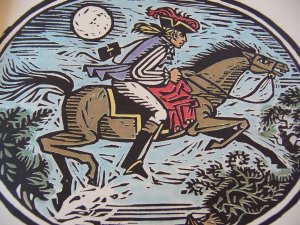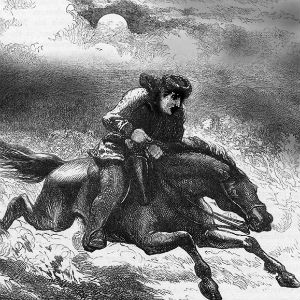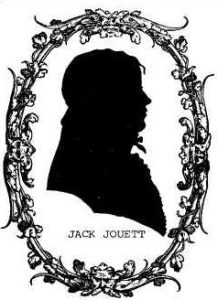Blog Archives
Jack Jouett’s Ride (sorry Revere, you weren’t the only one)
By Lindsay Roseberry, Reference Department
Listen my children and you will hear of the midnight ride of Paul Revere
But has anyone yet heard of the Southern Revere Jack Jouett?With apologies to Henry Wadsworth Longfellow

Jack Jouett’s Ride by Gail Haley
While most know the story of Paul Revere’s late night ride to warn of the coming British, the ride of John (Jack) Jouett to warn Jefferson and the legislatorsis often forgotten. Jouett was at the right place at the right time to warn Thomas Jefferson and others that the British were coming—in Virginia. In 1781, he was the captain of the Virginia Militia, stationed in Louisa, VA, still a small town even today. On June 3, he was sleeping out on the lawn of the Cuckoo Tavern in Louisa County, VA, when the noise of many horses racing down the street woke him up. (Why he was sleeping outside was not known. It could be the tavern had no rooms, or the rooms they had were full. It could have been a fine night for sleeping outdoors. By all accounts, he was a big man, said to be 6’4” and around 220 pounds—perhaps the ground was more comfortable than a too-short bed.)
He sat up and saw they were a legion of British loyalist dragoons, a unit of 250 soldiers! These were American colonists loyal to Britain, and wore white coats instead of red. They were especially hated; they were led by Col. Banastre Tarleton’s. (Tarleton was nick-named the Butcher, so we know what the colonists thought of him. He earned this nickname at another battle when his troops killed colonists attempting to surrender.) Jouett saw that Tarleton was leading them and realized at once that their objective was the Virginia General Assembly, meeting in Charlottesville.
 Why were they meeting in Charlottesville? The British army, with assistance from Benedict Arnold, had just weeks ago captured the capitol of Virginia—Richmond. Jefferson had suggested they all retreat to Charlottesville, close to his home of Monticello. Thomas Jefferson, Patrick Henry and other radical “rebels” were meeting there in the General Assembly; Jefferson was governor at the time. The problem was that the assembly was not protected by any military presence. The Continental arm was either with General Washington in the north or with General Lafayette who was too far away to get there in time. Jouett knew all of this in an instant, and knew he had to warn the assembly members.
Why were they meeting in Charlottesville? The British army, with assistance from Benedict Arnold, had just weeks ago captured the capitol of Virginia—Richmond. Jefferson had suggested they all retreat to Charlottesville, close to his home of Monticello. Thomas Jefferson, Patrick Henry and other radical “rebels” were meeting there in the General Assembly; Jefferson was governor at the time. The problem was that the assembly was not protected by any military presence. The Continental arm was either with General Washington in the north or with General Lafayette who was too far away to get there in time. Jouett knew all of this in an instant, and knew he had to warn the assembly members.
The road from Cuckoo, a tiny village in Louisa County, ran northwesterly to the gap in the Southwest Mountains, a distance of about 38 miles to Charlottesville. Jack was familiar with the route because his father owned the Swan Tavern there, sitting just across from the courthouse. Understanding that the assembly needed to be warned immediately, he rode off on his horse Sallie along the rough mountain road (knowing the soldiers were taking the main road) in the dark with just the light of the moon to guide his way. It was said that the scars from the lashing of trees and bushes from this wild ride marked his face for the rest of his life. (For contrast, Paul Revere rode for only 15 miles over good roads.) He made it to Monticello at dawn, rousting Jefferson and those who were staying at his house.
Jefferson got his family out, got his important documents and then realized he had left his sword. He went back and saw the dragoons enter his yard. Some reports say he hid in a hollow tree to hide from them. Jouett then rode on to Charlottesville and warned the assemblymen; most of whom were staying at the Swan Tavern. Only seven were captured by Tarleton and his men. Thanks to Jack Jouett’s ride, four signers of the Declaration of Independence escaped capture. So did a future president, the father of another future president, and many others.
 So why haven’t you heard of Jack Jouett before? He was not already famous like Revere was when he rode to Charlottesville. True, he was honored by the Virginia Assembly—they gave him two silver pistols and a jeweled sword. More likely, you never heard of him because he moved to the Virginia frontier after the Revolutionary War was over. That Virginia frontier turned into the state of Kentucky. In 1782, he moved to Harrodsburg, KY, which had recently been established. He married and had twelve children, one of whom was the famous portrait painter Matthew Harris Jouett. He was friends with Andrew Jackson, served four terms in the Kentucky legislature and was a well-regarded planter and horse breeder. Sallie, his brave and valiant horse, was the start of a long line of thoroughbred race horses. Jack Jouett died in 1822, and was buried on his farm.
So why haven’t you heard of Jack Jouett before? He was not already famous like Revere was when he rode to Charlottesville. True, he was honored by the Virginia Assembly—they gave him two silver pistols and a jeweled sword. More likely, you never heard of him because he moved to the Virginia frontier after the Revolutionary War was over. That Virginia frontier turned into the state of Kentucky. In 1782, he moved to Harrodsburg, KY, which had recently been established. He married and had twelve children, one of whom was the famous portrait painter Matthew Harris Jouett. He was friends with Andrew Jackson, served four terms in the Kentucky legislature and was a well-regarded planter and horse breeder. Sallie, his brave and valiant horse, was the start of a long line of thoroughbred race horses. Jack Jouett died in 1822, and was buried on his farm.
In an attempt to help promote Jouett’s memory, the Charlottesville Daily Press published the following poem on October 26, 1909:
Hearken good people: awhile abide
And hear of stout Jack Jouett’s ride;
How he rushed his steed, nor stopped nor stayed
Till he warned the people of Tarleton’s raid.The moment his warning note was rehearsed
The State Assembly was quickly dispersed.
In their haste to escape, they did not stop
Until they had crossed the mountain top.
And upon the other side come down.
To resume their sessions in Staunton Town.His parting steed he spurred,
In haste to carry the warning
To that greatest statesman of any age,
The Immortal Monticello Sage.
Here goes to thee, Jack Jouett!
Lord keep thy memory green;
You made the greatest ride, sir,
That ever yet was seen.”
Sources:
- http://www.americanrevolution.org/jouett.php
- http://military.wikia.com/wiki/Jack_Jouett
- http://www.readthehook.com/90493/overnight-ride-jack-jouett%E2%80%99s-race-cuckoo
- https://allthingsliberty.com/2013/03/from-cuckoo-to-charlottesville-jack-jouetts-overnight-ride/
- http://explorekyhistory.ky.gov/items/show/469
- http://www.kentuckytourism.com/jack-jouett-house-historic-site/11491/
- http://harrishomestead.com/harris-family-history/jack-jouett/